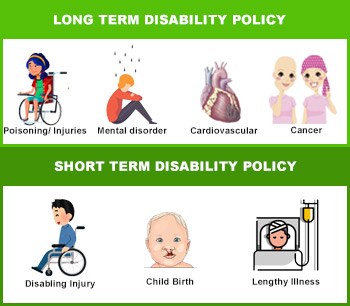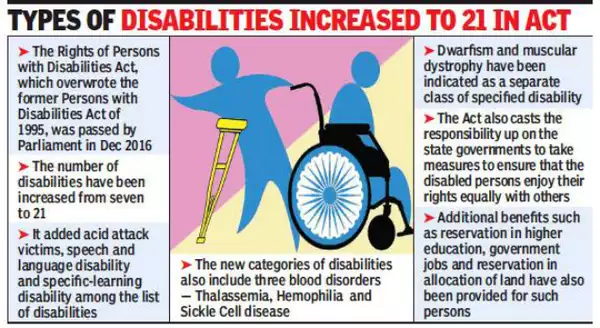Description

Copyright infringement not intended
Context - The Ministry of Social Justice and Empowerment Ministry has asked for public opinion on the new draft national policy on persons with disabilities (PwD).
Details
The recently published draft stated that the current national programme on the prevention of disabilities focused only on “traditional causes”, and was silent on other factors like malnourishment, medical negligence, socio-cultural factors and impairment caused by disasters.
- The Rights of Persons with Disabilities Act, 2016, has extended the number of disabilities from 7 to 21.

Copyright infringement not intended
Rights of Persons with Disabilities Act, 2016
- The Act replaced the Persons with Disabilities Act of 1995.
- India is a signatory of the United National Convention on the Rights of Persons with Disabilities (UNCRPD). The act fulfils the commitment made by India at UNCRPD.
- Under the Act, types of disabilities have been increased from the existing 7 to 21 and it authorized the Central Government to add more types of disabilities.
- The 21 disabilities are;
- Blindness
- Low-vision
- Leprosy Cured persons
- Hearing Impairment (deaf and hard of hearing)
- Locomotors Disability
- Dwarfism
- Intellectual Disability
- Mental Illness
- Autism Spectrum Disorder
- Cerebral Palsy
- Muscular Dystrophy
- Chronic Neurological conditions
- Specific Learning Disabilities
- Multiple Sclerosis
- Speech and Language disability
- Thalassemia
- Haemophilia
- Sickle Cell disease
- Multiple Disabilities including deaf, and blindness.
- Acid Attack victim
- Parkinson's disease
- First-time Speech and Language Disabilities and Specific Learning disabilities have been added to the list.
- Acid Attack Victims and Dwarfism are also included in the list of Disability.
- The list of disabilities also included three blood disorders;
- Thalassemia
- Haemophilia
- Sickle Cell disease
- Directed the governments to ensure that persons with disabilities enjoy their rights equally with others.
- Persons with benchmark disabilities and those with high support will get additional benefits such as reservations in higher education, government jobs, poverty alleviation schemes etc.
- Every child between the age group of 6 and 18 years with the benchmark disability shall have the right to free education.
- Ensure their accessibility in public buildings (both Government and private).
- Reservation in Public vacancies has been increased from 3% to 4% for persons with benchmark disability.
- Central and State Advisory Boards on Disability to serve as the highest policy-making bodies at the Central and State level.
- District-level committees by the State Governments to address local concerns of PwDs.
- National and State Fund to provide financial support to persons with disabilities.
- Strict Punishment and Penalties for offences committed against persons with disabilities.
- Special Courts in each district to take cases regarding violation of rights of PwDs.
- The Act provided an effective tool for ensuring their empowerment and true inclusion into mainstream society in an acceptable manner.
https://epaper.thehindu.com/Home/ShareArticle?OrgId=GHE9TRVG0.1&imageview=0
1.png)
https://t.me/+hJqMV1O0se03Njk9















